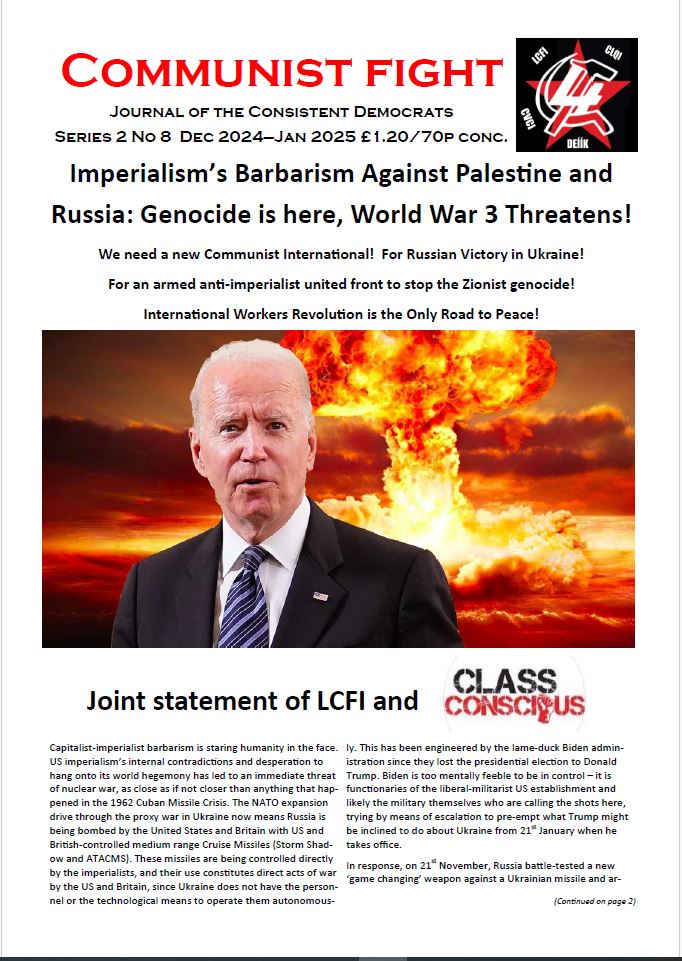
(Article produced by LCFI comrades in Brazil)
Lula obtained more than 60 million votes. The largest vote by a president in the entire history of Brazil. His highest vote was among the most exploited and oppressed sectors of the country. The North-East region, with high levels of misery and unemployment, guaranteed this historic victory, as well as the industrial centers of the country. The elections distortedly expressed the class struggle in the country, with the proletariat supporting Lula, despite the broad front, and the urban and agrarian bourgeoisie supporting Bolsonaro.
Bolsonaro obtained almost 8 million more votes than in 2018, demonstrating a nationalisation and growth of the political forces of the extreme right. However, in 2022 Bolsonaro lost votes in the three richest and most industrialized states, São Paulo (-12.7%), Rio Janeiro (-11.5%) and Minas Gerais (-8.4%). Noting that Bolsonaro lost the election in Minas Gerais. This means a shift to the left of working class battalions.
Bolsonaro’s defeat was a victory for the working classes. Even under threats of dismissal by the bosses, with vote buying, with the Federal Highway Police (PRF) blockades and pressure from religious leaders, the masses elected Lula to defend their rights.
Now, Bolsonarism is not accepting defeat. Bolsonaro remains silent for the press, but frantically coordindating with the military and other reactionary segments that are carrying out actions to refuse to accept the electoral result as a ban on federal highways.
On Monday, October 31, the National Confederation of Transport and Logistics Workers (CNTTL) published a note of repudiation of the protests, classifying them as “undemocratic”:
“We are experiencing an anti-democratic action by some segments that do not represent the category of autonomous truck drivers of non-acceptance of the results of the polls. We need to respect what the people decided at the polls: the victory of Luís Inácio Lula da Silva”.On the 31st, there were 338 obstruction points in 23 states and the nation’s capital. It is mainly about two segments: a group directly mobilized by the owners of the transport companies (employer lockout) and, another group, a fascist current among the truck drivers. In addition to these sectors, some police officers and farmers joined the blockades, which, despite this, ebbed in the last few hours, mainly due to the action of the population .
In fact, the coup blockades started on the voting day of the second round of elections, November 30th. They were initiated by the Federal Highway Police (PRF), which mobilized 5,000 agents to block passenger traffic in regions where Lula won in the first round with more than 70% of the votes. The graph shows that places where the PRF made it difficult for voters to access the polls coincide with regions where the former president had more votes.
The coup blockades of the bosses, farmers and police were a continuation of those of the police of the previous day. However, on Monday itself, the working population, especially the proletariat of poor neighborhoods and workers leaving the workplace, began to sweep the coup plotters off the roads. In São Mateus (Espirito Santo), the population threw stones at trucks so an ambulance could pass , and shipbuilding workers in Angra dos Reis (Rio de Janeiro) armed with clubs drove the coup plotters off the highway.
During the elections, Minister Alexandre de Moraes, president of the Superior Electoral Court (TSE), assured in a press interview that the PRF’s action was legitimate and necessary. The roadblocks by the coup plotters in almost every state in the country lasted more than 24 hours without the Supreme Electoral Court (STE) taking a stand against them. It was only after the working population itself began to clear the roads through their direct action that the Supreme Court (STF) took a formal position.
In view of this, trade union centrals, left-wing parties, popular leaders and progressive politicians must go beyond the policy of simply despising the coup action, believing that it unravels itself. Also, they cannot trust the judiciary to ensure legality. These leaders must join, summon and help organize the initiatives of the working population to sweep the Bolsonarist gangs from the streets.


i could not agree more.
i wish there was an org. like consistent democrats here in the USA NY City